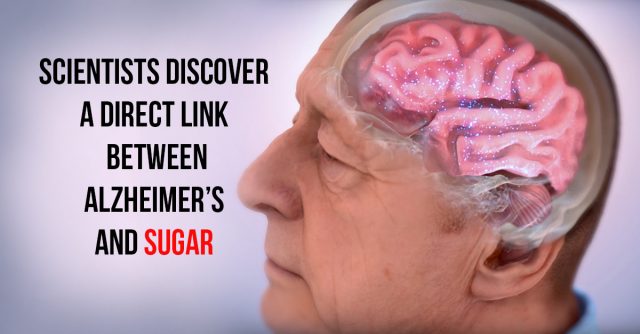New research reveals a link between high blood sugar levels and Alzheimer’s disease, raising awareness of how important our diet is in the prevention of the most common form of dementia.
Alzheimer’s disease accounts for 60% to 80% of dementia cases, making it the most common form of dementia. This serious disease is the 6th leading cause of death in the U.S. with 5,5 million Americans being affected by it in 2017.
Deaths from the disease have skyrocketed since 2000, increasing by 89% and the trend will only rise in the future – it has been estimated that the number of people living with Alzheimer’s will rise to 16 million by 2050. In fact, every 66 seconds, someone in the U.S. develops Alzheimer’s.
While this disease can occur due to a combination of factors, it has been discovered that there is a direct link between a sugary diet and cognitive decline which can lead to Alzheimer’s.
As Yutaka Kiyohara, MD, an environmental medicine researcher at Kyushu University in Fukuoka, Japan, has found in a study he led, people with diabetes had a double risk of developing Alzheimer’s or dementia of any kind compared to those with normal blood sugar levels.
The 1,000 men and women aged over 60 who participated in the study were all dementia-free when the tests were done. Over the next 15 years, 23% of those participants received a diagnosis of dementia, and slightly less than half of those cases were deemed to be Alzheimer’s disease.
It was found that the participants with diabetes and prediabetes had an increased risk of dementia diagnosis, with the association being weaker for prediabetes.
In order to further analyze the link between high blood sugar levels and dementia, Professor Melissa Schilling, a strategy and innovation expert at the NYU Stern School of Business, conducted a large-scale review of hundreds of studies which focused on the pathway between insulin and Alzheimer’s.
She discovered that hyperinsulinemia, which is the condition of having an excessively high amount of insulin in the blood, is responsible for almost half of all cases of Alzheimer’s.
Hyperinsulinemia is most often caused by obesity, prediabetes, and early or undiagnosed diabetes. In this condition, the body fights to produce larger quantities of an insulin-degrading enzyme, which at the same time is responsible for breaking up amyloid proteins. These proteins have been found in large amounts in people with Alzheimer’s.
The reason why this insulin-enzyme interaction affects the breaking up of the amyloid proteins is that once high amounts of insulin enter the bloodstream, most of the available enzymes are redirected for the breaking up of the excess insulin rather than the amyloid proteins.
“What I’ve learned from my innovation research is that specialists can become trapped in the logic of their field, so new perspectives often come from outsiders,” said Professor Schilling. “If we can raise awareness and get more people tested for hyperinsulinemia, especially those who have been diagnosed with or who are at risk for dementia, it could significantly lessen the incidence of Alzheimer’s disease and vascular dementia, as well as other diabetes-related health problems.”
The same risk goes for people with type 1 diabetes, who, being unable to produce insulin in the first place, also lack the insulin-degrading enzyme. Although this puts people suffering from diabetes at a higher risk of dementia, it doesn’t exclude people with high-carb diets and large quantities of sugar intake.
As a 2012 study, which looked at the diets of nearly 1,000 people, shows, people whose diet came from mostly carbs had an 80% increased chance of developing mild cognitive impairment or dementia, in comparison to those who had the least amount of carbohydrate intake. The same risk was reduced in participants who had diets rich in fat and protein.
When you consider the fact that some Alzheimer’s factors cannot be controlled, the best you can do is put the controllable ones into order. Eating a healthy and balanced diet from a young age and doing regular exercise will help your body process insulin more effectively.
And while sugar is highly addictive and the best answer for every little nuisance, its long-term effects can be devastating. Remember that you are the only person responsible for your health and your current decisions will have a lasting effect on your wellbeing.
SOURCES:
HTTPS://WWW.ALZ.ORG/ALZHEIMERS_DISEASE_WHAT_IS_ALZHEIMERS.ASP
HTTPS://WWW.ALZ.ORG/DOCUMENTS_CUSTOM/2017-FACTS2017_INFOGRAPHIC.PDF
HTTP://EDITION.CNN.COM/2011/09/19/HEALTH/DIABETES-DOUBLES-ALZHEIMERS/INDEX.HTML
HTTPS://WWW.NEWS-MEDICAL.NET/NEWS/20160413/NYU-STERN-INNOVATION-EXPERT-UNCOVERS-NEW-LINK-BETWEEN-DIABETES-AND-ALZHEIMERS-DISEASE.ASPX
HTTPS://WWW.NCBI.NLM.NIH.GOV/PMC/ARTICLES/PMC4927856/
HTTPS://WWW.NCBI.NLM.NIH.GOV/PUBMED/22810099


